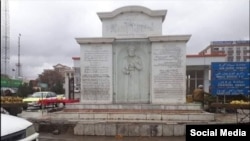Afghanistan's Taliban authorities recently pulled down a monument depicting a 15th-century Uzbek poet -- only to promise two days later to rebuild it, a rapid U-turn that may signal a pragmatic side to the militant group's rule.
RFE/RL's Uzbek Service reported that the final destruction of the statue, on August 18, was followed by an outcry from residents of Mazar-e Sharif, in northern Afghanistan.
Speaking to RFE/RL on condition of anonymity, residents said the authorities justified the move on religious grounds, stating that images and statues of human beings are banned by Shari'a law.
Alisher Navoi is revered as a founder of Uzbek literature and a key figure in the Chagatai cultural heritage shared by many Turkic-speaking peoples of Eurasia.
Paris-based Afghan writer and activist Saiyera Rahmani called it "a major blow to the dignity of Uzbeks and to cultural diversity in Afghanistan."
Then, as the outcry continued, the saga took a surprising turn.
Taliban officials held a public event attended by members of Uzbekistan's diplomatic mission and pledged to rebuild the monument.
Uzbek Foreign Ministry spokesman Akhror Burkhanov said at the time that "local authorities decided to remove it because the location was deemed unsuitable."
"Furthermore, Afghan representatives affirmed their respect for Alisher Navoi, an important historical figure for both Afghanistan and Uzbekistan, and assured that his legacy would be properly commemorated. They pledged to raise a new monument dedicated to him, improving the surrounding area, restoring inscriptions about his life and work, and naming the location in his honor," Burkhanov said in a post on X social network.
Follow The Money
The abrupt reversal recalled a situation last year when Afghan media outlets reported that the Taliban had asked the Uzbek government stop to hosting musical performances at the Termiz International Trade Center, located along the Afghan-Uzbek border.
The center, which opened in late August 2024, serves as a free-trade zone in Uzbekistan where visitors, including Afghans, can trade for up to 15 days using multiple currencies without needing a visa.
It has continued to stage music events, and the Uzbek Foreign Ministry, in an apparent attempt to save face for the Taliban, clarified that no such request had been made.
Together, the two incidents raise the question: Why is the Taliban so considerate of Uzbekistan's wishes? Previously, the Taliban has been unyielding in its drive to destroy what it regards as idolatrous monuments, most notoriously the ancient Bamiyan Buddha in 2021.
The answer may be simply to follow the money. The Taliban may have decided that rebuilding a statue honoring one of Uzbekistan's most cherished cultural figures is a low-cost gesture to keep Tashkent on board.
Since the Taliban returned to power in Kabul, Uzbekistan has emerged as a key economic partner for Afghanistan. Earlier this year, Tashkent announced $243 million in investments for four Afghan energy projects alongside new agreements on trade and transit routes.
In May, Uzbekistan opened official trade centers hosting Uzbek state enterprises in Kabul and Mazar-e Sharif.
Afghanistan's economy, which has been heavily impacted by conflicts and sanctions, also relies heavily on border trade and electricity imports from its more developed northern neighbor.
Afghanistan is currently afflicted by catastrophic food shortages and has seen a massive cut in foreign aid.











